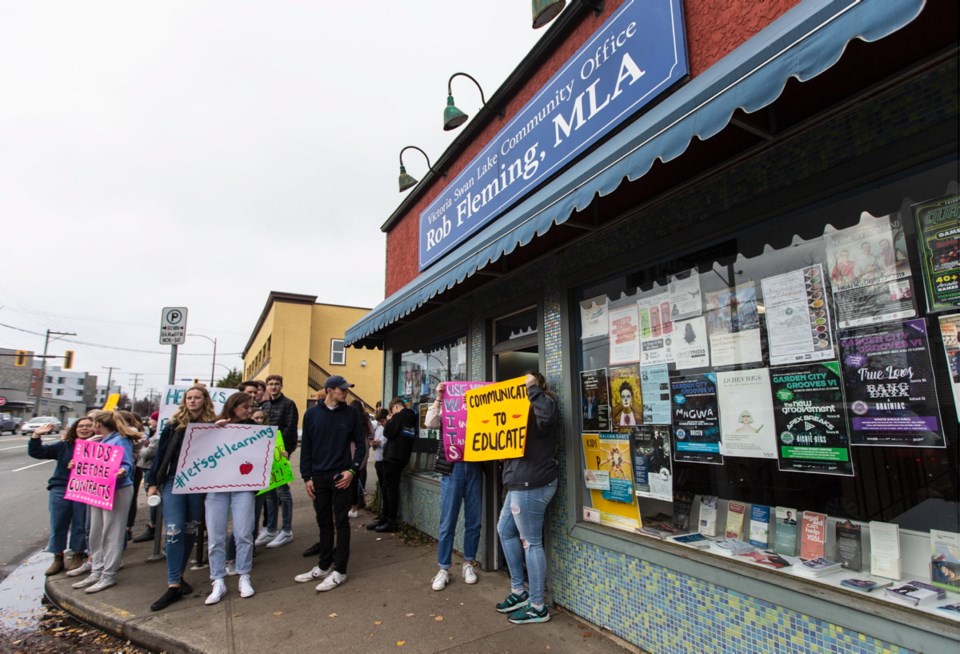Now that the Saanich school strike appears over, it’s time for some hard questions.
First off, how could the province let this disruption drag on so long? Grade 12 pupils were suffering the possibility that their chances of being admitted to a post-secondary institution were weakening by the day.
Parents were faced with paying for child care that might have been at the limits of affordability, or taking time off work and risking the consequences.
There were suggestions in the closing days of the strike that either a mediator or an arbitrator should have been brought in.
Andrew Wilkinson, leader of the provincial Liberal party, called for mediation. That process isn’t binding — it’s simply an effort by a third-party intervenor to see if a possible deal can be worked out.
Arbitration is final. If both sides agree to go this route, they thereby commit to accept the outcome, whatever it might be.
If I had been Rob Fleming, the education minister, I wouldn’t have touched either proposal with a barge pole.
First, in order to maintain their professional standing, mediators and arbitrators have to appear unbiased in any dispute they work on. And realistically, the only way to do that is to come down somewhere in the middle. I can’t ever recall one of these settlements giving one side everything and the other nothing.
But that means the union will almost certainly get more from such a process than the employer has offered. In addition, mediators and arbitrators have no skin in the game. Whatever money they award doesn’t come out of their pocket.
Bottom line, no union should ever settle if the employer signals it is open to third-party dispute resolution.
Second, the provincial government currently has a “me too” clause in all its public-sector contracts. This means any additional award that might come from arbitration must automatically be added to these other agreements. But that shoots a huge hole in the province’s negotiating mandate.
The proper solution was back- to work legislation. I realize entirely how difficult that would have been for an NDP government.
I recall Allan Blakeney’s NDP administration in Saskatchewan ordering a union back to work just weeks before the 1982 election.
The party faithful were scandalized, and the government went down to a hammering defeat. Even the attorney general and deputy premier Roy Romanow, lost in Saskatoon. He was defeated by a pretty clueless 23-year-old gas jockey.
That said, back-to-work legislation is nothing new to B.C. There have been three such orders involving the teachers’ union since 1994.
Moreover, when the current government introduced its public-sector mandate, ministers had to know someone was going to take them on. If you’re not willing to enforce your mandate, if need be by legislation, why would you go that route in the first place?
It would have been perfectly possible to announce general guidelines, while leaving room for more generous settlements in particular situations.
CUPE 441, the union local behind the school strike, argued it occupied such a position. Some years back, faced with the possibility of layoffs, the union agreed to a less generous financial settlement than some other locals got. Now it wants that monetary disparity removed.
I confess this sounds rather like having your cake and eating it too. But no matter.
It is precisely to foresee inevitable anomalies of this kind that negotiating mandates should be configured.
I thought it was brave of the province to nail down such a firm position. No doubt this was done, both to counter the reputation of previous NDP administrations for financial laxity, and to send a message to the labour sector that bullying wouldn’t work.
But having taken that stance, and unpleasant as it would have been for all concerned, a legislative order was long since overdue.



